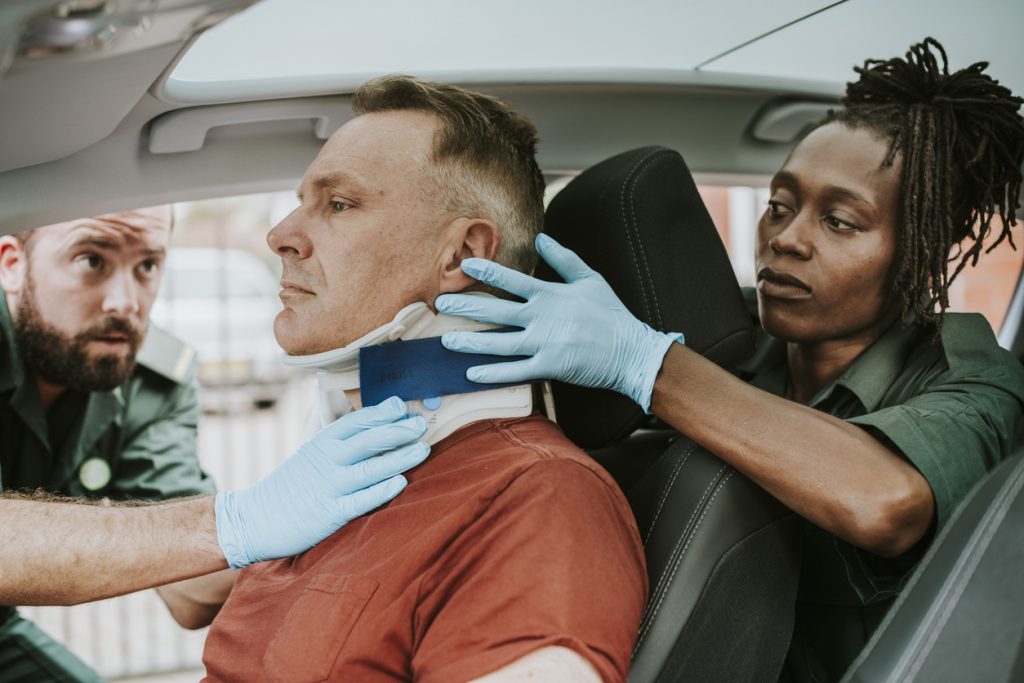After an auto accident, immediate medical evaluation is crucial, as injuries may not be immediately apparent. Seeking prompt medical attention ensures proper diagnosis and treatment, preventing potential complications that could arise from overlooked injuries. This evaluation can include physical examinations, imaging tests, and observation to determine the extent of injuries sustained during the incident.
Many individuals underestimate the importance of receiving medical evaluations after an accident due to the adrenaline that masks pain. This can lead to serious consequences, as some injuries, such as concussions or internal bleeding, may not show symptoms right away.
Initial Response and Assessment at the Accident Scene
The initial response to an auto accident is critical for ensuring safety and proper medical evaluations. Swift action is essential for minimizing injuries and gathering necessary information for legal purposes.
Safety and Emergency Care
The first priority at an accident scene is safety. First responders must assess the surrounding environment to prevent further incidents. This includes signaling for additional help and securing the area to protect victims and bystanders.
Emergency medical personnel will typically perform a quick triage to prioritize care based on injury severity. Vital signs are assessed, and any life-threatening conditions need immediate attention. In Washington State car accident attorneys emphasize the need for proper documentation of injuries for future legal claims, making this initial care pivotal.
Legal Considerations and Documentation
Immediate documentation is crucial for future legal proceedings. First responders should collect information about the scene, including photographs, witness statements, and notes regarding vehicle positioning and road conditions.
In Washington, accident reports filed by law enforcement can play a significant role in personal injury claims. It is important for first responders to accurately record details such as the time of the accident, parties involved, and any citations issued. This documentation supports potential lawsuits by providing a clear account of events.
Medical Evaluation by First Responders
First responders conduct thorough medical evaluations to identify injuries that may not be immediately apparent. They look for signs of trauma, including bruising, bleeding, or signs of shock.
Standard practices include checking for spinal injuries, head trauma, and potential internal injuries. If a patient is unresponsive, basic life support measures are implemented, followed by rapid transport to a medical facility if necessary. Accurate medical assessments contribute not only to patient care but also to establishing the extent of injuries for potential legal claims, highlighting the importance of these evaluations at the scene.
Post-Accident Medical Examination
A prompt and thorough medical examination is crucial after an auto accident. Key elements include gathering a detailed medical history, performing a physical examination, and considering specialized care when necessary.
Conducting a Thorough Medical History
Gathering a comprehensive medical history is the first step in post-accident evaluations. This should include previous injuries, chronic conditions, and any medications taken. It is essential to note signs or symptoms experienced immediately post-accident, such as dizziness, pain, or loss of consciousness.
Victims often may not report certain symptoms at first. Therefore, the evaluator should ask specific questions that prompt detailed responses. This method helps establish connections between the accident and any resulting injuries or conditions.
Physical Examination and Diagnostic Testing
A comprehensive physical examination assesses visible injuries and identifies any internal damage. Medical professionals should check for common injuries like whiplash, fractures, or concussions. They may also evaluate range of motion, strength, and neurological function.
Diagnostic testing, including X-rays, CT scans, or MRIs, plays a significant role. These tests can reveal injuries that may not be apparent during a physical exam. Proper documentation of findings aids in future medical care and legal considerations, especially if litigation arises.
Special Considerations in Auto Accident Trauma
Auto accidents can cause unique injuries that require special attention. Soft tissue injuries, for instance, are prevalent yet often overlooked in initial assessments. Symptoms may emerge days or weeks following the incident, making follow-up care essential.
Careful evaluation of psychological impacts, such as PTSD or anxiety, is also important. Emotional and mental health conditions may arise after the trauma, necessitating referrals to mental health professionals.
Referral to Specialists
Referrals to specialists may be necessary depending on the injuries sustained. An orthopedic surgeon, neurologist, or physical therapist could be essential for the recovery process. These professionals can provide targeted treatments based on the specific injuries identified.
Legal factors may also influence referrals. Consulting with a Car Accident Attorney in Washington State ensures that victims understand their rights and the necessity of thorough medical evaluations. A coordinated approach contributes to comprehensive care and effective legal remedies.





















